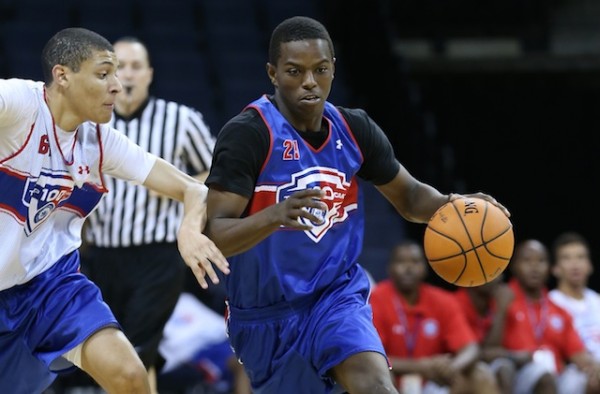Seton Hall’s Fishy Recruiting Tactics
Posted by Chris Johnson on September 20th, 2013Chris Johnson is an RTC Columnist. He can be reached @ChrisDJohnsonn.
There will be some measure of disbelief the first time you see it. Don’t hesitate to look, just know that when you start scratching your head, trying to think of an explanation, your eyes do not deceive you: the above link takes you directly to a list of Seton Hall’s 2014 recruiting class, which now counts three top-100 commitments, including Thursday’s huge addition: Lincoln High School (NY) shooting guard Isaiah Whitehead, a consensus five-star prospect ranked well within the top 40 of any recruiting database, ended his high profile recruitment Thursday when he committed to the Pirates. Whitehead, an explosive 6-foot-3 shooting guard with possible one-and-done designs, received offers from Indiana, Kentucky, Louisville, UCLA, Syracuse, and other big-name high-major programs. Before Thursday’s decision, Whitehead was believed to have narrowed his lengthy list to two schools: St. Johns (who Whitehead visited Wednesday, and thus the school many expected Whitehead to choose) and Seton Hall. As word of the five-star guard’s announcement circulated, it was easy for one’s mind to wander: what led Whitehead to choose Seton Hall, a long-dormant program under Kevin Willard, over the Steve Lavin-led Red Storm? Was there something behind Whitehead’s decision not made apparent at his announcement? That seemed to be the implication from a New York Post report divulging the imminent hiring of Dwayne “Tiny” Morton, Whitehead’s middle school teacher and high school coach (and founder of Juice All-Stars, Whitehead’s AAU team), to Seton Hall’s staff. The sequence of events did not really leave much room for interpretation: Whitehead appeared to be a “package” deal.

If Seton Hall can’t compete with top programs for high-level recruits, bundling players assistants is a legal, yet questionable, workaround (Photo credit: Under Armour/Kelly Kline)
I’ll answer the question that surely popped into your brain sometime over the last five seconds: No, there is nothing illegal about Seton Hall’s reported decision to hire Morton. The NCAA instituted a rule last season prohibiting the hiring of third-parties connected to recruits to any position other than one of the three assistant spots allotted to each team. Morton is expected to become one of the Pirates’ three assistants, making his new position perfectly valid – in the eyes of the NCAA. How the rest of the college hoop world (fans, rival coaches, and players) feel about this is another story entirely. Before you make a conclusive judgment, there is a pattern of repeated behavior worth discussing that might influence your opinion. Whitehead may be the latest package deal in Seton Hall’s 2014 class, but he’s not the only one. It was just over a month ago that 2014 four-star forward Angel Delgado’s commitment to Seton Hall was followed weeks later by the Pirates’ hiring of Oliver Antigua, who knew Delgado through his assistant’s role on the national program of Delgado’s native Dominican Republic. Or go back five months earlier, when 2013 point guard Jaren Sina – who reneged on his verbal commitment to Northwestern after the Wildcats replaced former coach Bill Carmody with Chris Collins – opted to join Seton Hall right around the time Fred Hill, a former Northwestern assistant instrumental to the New Jersey-based Sina’s initial commitment to the Wildcats, was added to the Pirates’ staff. That makes Morton’s potential addition Seton Hall’s third prospect-tethered hire under Willard over the past six months.









































